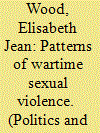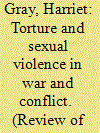| Srl | Item |
| 1 |
ID:
086647


|
|
|
|
|
| Publication |
2009.
|
| Summary/Abstract |
Sexual violence incuding rape, sexual torture, sexual slavery, and forced abortion is a common form of violence against some of the most vulnerable civilians during war. As a result of the mobilization by women's groups advocating prosecution of rape in Bosnia and Rwanda, international legal authorities now prosecute various forms of sexual violence as war crimes, as crimes against humanity, and, in some contexts, as genocide.
|
|
|
|
|
|
|
|
|
|
|
|
|
|
|
|
| 2 |
ID:
171918


|
|
|
|
|
| Summary/Abstract |
Despite the wide repository of knowledge about conflict-related sexual violence that now exists, there remains a lack of understanding about how victims/survivors of such violence themselves make sense of and frame their experiences in conversation with global and local discourses and with the categorisations that underpin support programmes. Such sense-making is important not only because the ways in which violence is categorised shape a victim/survivor's ability to access particular forms of recognition and support, but also because it is central in how shattered selves and worlds are remade in the aftermath of violence. Drawing on individual and group interviews conducted with refugees living in Kampala, Uganda, this article charts how framings of ‘torture’ and ‘sexual violence’ become meaningful in participants’ accounts in the (re)formation of themselves as subjects after violent victimisation. We trace how participants navigate the heteronormative societal and legal norms that shape their subjectivity and the effects of the violence they experienced through the deeply gendered and political work that these terms do in their narratives. Our analysis thus highlights and reminds us to pay attention to the political stakes involved in fluid processes of categorising injury.
|
|
|
|
|
|
|
|
|
|
|
|
|
|
|
|